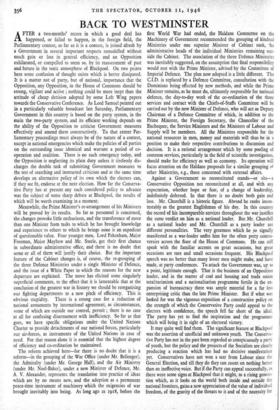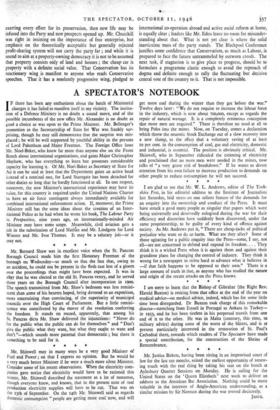BACK TO WESTMINSTER
AFTER a two-months' recess in which a good deal has happened, or failed to happen, in the foreign field, the Parliamentary contest, so far as it is a contest, is joined afresh by a Government in several important respects remodelled without much gain or loss in general efficiency, and an Opposition exhilarated, or compelled to seem so, by its reassessment of past and future in the tonic atmosphere of Blackpool. On two points here some confusion of thought exists which is better dissipated. It is a matter not of party, but of national, importance that the Opposition, any Opposition, in the House of Commons should be strong, vigilant and active ; nothing could be more inept than the attitude of cheap derision adopted by some Left Wing papers towards the Conservative Conference. As Lord Samuel pointed out in a particularly valuable broadcast last Saturday, Parliamentary Government in this country is based on the party system, in the main the two-party system, and its efficient working depends on the ability of the Opposition to criticise Government measures effectively and amend them constructively. To that extent Par- liamentary proceedings must always be of the nature of a contest, except in national emergencies which make the policies of all parties on the outstanding issue identical and warrant a period of co- operation and coalition. There is no such emergency today, and the Opposition is neglecting its plain duty unless it tirelessly dis- charges the double task of submitting Government measures to the test of searching and instructed criticism and at the same time develops an alternative policy of its own which the electors can, if they see fit, endorse at the next election. How far the Conserva- tive Party has at present any such considered policy to advance was the subject of some sharp debate at Blackpool, the results of which will be worth examining in a moment.
Meanwhile, the Prime Minister's re-arrangement of his Ministers will be proved by its results. So far as personnel is concerned, the changes provoke little enthusiasm, and the transference of more than one Minister from tasks to which he has brought knowledge and experience to others to which he brings none is an expedient of questionable value. Four younger men, Lord Pakenham, Major Freeman, Major Mayhew and Mr. Steele, get their first chance in subordinate administrative office, and there is no doubt that some or all of them will justify their choice. But the important feature of the Cabinet changes is, of course, the re-grouping of the three Defence Ministries under a single Minister of Defence, and the issue of a White Paper in which the reasons for the new departure are explained. The move has elicited some singularly superficial comments, to the effect that it is lamentable that at the conclusion of the greatest war in history we should be reorganising our fighting departments to a new pitch of efficiency. This is obvious stupidity. There is a strong case for a reduction of national armaments by international agreement, as circumstances, some of which are outside our control, permit ; there is no case at all for confusing disarmament with inefficiency. So far as that goes, we have specific obligations under the United Nations Charter to provide detachments of our national forces, particularly our air-forces, as instruments of the United Nations in case of need. For that reason alone it is essential that the highest degree of efficiency and co-ordination be maintained.
The reform achieved here—for there is no doubt that it is a reform—in the grouping of the War Office (under Mr. Bellenger), the Admiralty (under Mr. George Hall), and the Air Ministry (under Mr. Noel-Baker), under a new Minister of Defence, Mr. A. V. Alexander, represents the translation into practice of ideas which are by no means new, and the adoption as a permanent peace-time instrument of machinery which the exigencies of war brought inevitably into being. As long ago as 1918, before the first World War had ended, the Haldane Committee on the Machinery of Government recommended the grouping of kindred Ministries under one superior Minister of Cabinet rank, he administrative heads of the individual Ministries remaining out- side the Cabinet. The association of the three Defence Ministries was inevitably suggested, on the assumption that final responsibility would rest with the Prime Minister, advised by the Committee of Imperial Defence. The plan now adopted is a little different. The C.I.D. is replaced by a Defence Committee, consultation with the Dominions being effected by new methods, and while the Prime Minister remains, as he must do, ultimately responsible for national defence, the day-to-day work of the co-ordination of the three services and contact with the Chiefs-of-Staffs Committee will be carried out by the new Minister of Defence, who will act as Deputy Chairman of a Defence Committee of which, in addition to the Prime Minister, the Foreign Secretary, the Chancellor of the Exchequer, the Service Ministers and the Ministers of Labour and Supply will be members. All the Ministers responsible for the national resources in men, money and materials will thus be in a position to make their respective contributions to discussion and decision. It is a rational arrangement which by some pooling of common services, particularly in the field of scientific investigation, should make for efficiency as well as economy. Its operation will focus attention on the Haldane proposals for a similar grouping of other Ministries, e.g., those concerned with external affairs.
Against a Government so reconstituted stands—or sits—a Conservative Opposition not reconstituted at all, and With any expectation, whether hope or fear, of a change of leadership, indefinitely deferred. In that there is no doubt both gain and loss. Mr. Churchill is a historic figure. Abroad he ranks incon- testably as the greatest Englishman of his day. In this country the record of his incomparable services throughout the war justifies the same verdict on him as a national leader. But Mr. Churchill as a national leader and Mr. Churchill as a party leader are different personalities. The very greatness which he so signally manifested as a war-leader unfits him for the often petty contro- versies across the floor of the House of Commons. He can still speak with the familiar accents on great occasions, but great occasions are rare and small occasions frequent. His Blackpool speech was no better than many lesser men might make, and have made, at party conferences. To attack the Government was, up to a point, legitimate enough. That is the business of an Opposition leader, and in the matter of coal and housing and trade union totalitarianism and a nationalisation programme fertile in the ex- pansion of bureaucracy there was ample material for a far less enterprising critic than the late Prime Minister. But if what was looked for was the vigorous exposition of a constructive policy on the strength of which the Conservative Party could appeal to the electors with confidence, the speech fell far short of the ideal. The party has yet to find the inspiration and the programme which will bring it in sight of an electoral victory.
It may quite well find them. The significant feature at Blackpool was the assertion of unofficial and unknown youth. The Conserva- tive Party has not in the past been regarded as conspicuously a party of youth, but the policy and the projects of the Socialists are clearly producing a reaction which has had no decisive manifestation yet. Conservatives have not won a seat from Labour since the General Election, and till they do they can count on nothing better than an ineffective voice. But if the Party can appeal successfully, as there were some signs at Blackpool that it might, to a rising genera- tion which, as it looks on the world both inside and outside the national frontiers, gains a new appreciation of the value of individual freedom, of the gravity of the threats to it and of the necessity for exerting every effort for its preservation, then new life may be infused into the Party and new prospects opened up. Mr. Churchill was right in insisting on the importance of free enterprise, but emphasis on the theoretically acceptable but generally rejected profit-sharing system will not carry the party far ; and while it is sound to aim at a property-owning democracy it is not to be assumed that property consists only of land and houses ; the cheap car is property with a definite social value. That Conservatism has its reactionary wing is manifest to anyone who reads Conservative speeches. That it has a resolutely progressive wing, pledged to international co-operation abroad and active social reform at home, is equally clear ; leaders like Mr. Eden leave no room for misunder- standing about that. What is not yet clear is where the solid inarticulate mass of the party stands. The Blackpool Conference justifies some confidence that Conservatism, as much as Labour, is prepared to face the future untrammeled by outworn creeds. The next task, if stagnation is to give place to progress, should be to formulate a programme elastic enough to avoid the reproach of dogma and definite enough to rally the fluctuating but decisive central vote of the country to it. That is not impossible.































 Previous page
Previous page